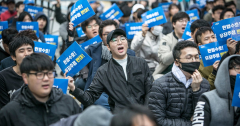Taipei, Taiwan; Seoul, South Korea; and Manila, the Philippines – Donald Trump’s popularity among young men who frequent the “manosphere” online has been widely cited as a factor in his re-election as president of the United States.
After making its mark in voting booths across the US, Trump’s appeal among male influencers and their followers is reverberating much further afield.
Across Asia, where countries such as China and South Korea are experiencing a growing gender divide that mirrors similar trends in the West, Trump’s return to the most powerful political office on the planet has been celebrated in male-dominated spaces online.
“Honestly, I really admire Trump, because he is not afraid to face his battles head-on,” zhtttyzhttty, a prominent influencer who discusses the challenges facing men on China’s social media platform Weibo, posted the day after Trump’s victory.
Sima Nan, an ultranationalist blogger who has more than 44 million followers on social media, welcomed Trump’s win despite his frequent criticism of the US, citing his “transactional mentality” as a positive.
“To put it bluntly, Trump is a trader. He calls himself a great trader. Trump will cut ties with Taipei and trade with Beijing,” Nan said on Weibo, referring to Beijing’s stance that self-governing Taiwan is part of its territory.
“Everything is for sale for him. The key is the price.”

On Chinese internet forums where many ordinary young men congregate, praise for Trump, who won 49 percent of male voters aged 18-29 in the US election, has been a common theme both before and since the November 5 vote.
“Trump is a businessman, and businessmen usher in the best of times,” one Weibo user wrote after Trump’s re-election.
“Only Trump tells you everything with certainty and clarity.”
When photos of Trump raising his fist moments after being struck in the ear by a would-be assassin’s bullet ricocheted around the world in July, internet users marvelled at the Republican candidate’s act of defiance.
“What an amazing photo,” one Weibo user said. “Trump is so strong,” he continued.
The admiration for Trump among some young Chinese stands in contrast to the president-elect’s aggressive rhetoric and policies towards their country.
Trump has for years cast China as a threat, accusing it of stealing American jobs and blaming it for unleashing the COVID-19 pandemic on the world.
During his election campaign and since, he has threatened to slap steep tariffs on Chinese imports – a move that could potentially inflict huge damage to Chinese companies and the Chinese economy.
As in other parts of the world, young Chinese men report holding increasingly conservative views relative to their female peers.
According to an analysis of Chinese survey data published in the International Journal of Comparative Sociology last year, young Chinese women were more than twice as likely to express egalitarian views than their male peers.
And while young Chinese women had far more egalitarian attitudes than previous generations of women, according to the analysis, young men had become only slightly more egalitarian over the same timeframe.
Qian Huang, an assistant professor who studies digital culture at the University of Groningen in the Netherlands, said she was not surprised by the support for Trump from the Chinese internet despite his hawkish stance towards Beijing.
“It’s quite similar to 2016 when he was first elected, but it has intensified and more people have joined the conversations,” Huang told Al Jazeera.
“Trump projects certain masculine traits that many modern men admire and associate with success, and that includes men outside China as well.”

Whether in the West or Asia, the “manosphere” is not precisely defined beyond being a segment of the internet that is dominated by men and appeals to their interests.
Discussions among male influencers and their followers range from misogynistic diatribes about women and critiques of feminism, to complaints about the struggles of men and advice about fitness and dating.
In South Korea, Jang Min-seo, who runs RedPillKorea, a YouTube channel focused on dating culture and gender issues that takes inspiration from British-American influencer and self-proclaimed misogynist Andrew Tate, welcomed Trump’s victory, viewing it as a win for freedom of speech and male assertiveness.
“I think Trump won the election because many Americans wanted a leader who had a bulldozer personality when it came to doing what they promised,” Jang, 35, told Al Jazeera.
As for South Korean President Yoon Suk-yeol, whose political future is in doubt following his short-lived declaration of martial law last week, Jang likened the politician to US President Joe Biden, who “doesn’t really know what he’s doing”.
“I don’t have any expectations for South Korea’s leaders as they’re so incapable by and large,” Jang said.
“Most South Korean politicians are limited to roles like inciting the feminism and PC movement. Authentic conservative politicians who get the job done seem to have disappeared with the fall of the military regime.”
Eight in 10 South Koreans in their 20s believe that gender conflict is a serious issue, with more than half of those saying that gender iss





